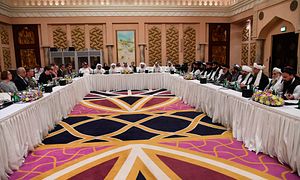Talks this week in Doha, Qatar between U.S. special envoy Zalmay Khalilzad and representatives of the Taliban have focused on a two-point agenda, according to a Taliban spokesman speaking to the Associated Press. That agenda features the withdrawal of U.S. troops from Afghanistan and a pledge on the part of the Taliban to not allow Afghan soil to be used to stage attacks.
Taliban spokesman Suhail Shaheen told the AP that the two sides are close to an agreement. “If we do not reach a solution in this round of talks, then we will in the next round of talks, but that is our target,” he said.
According to Wahid Muzhdah, a political affairs analyst in Kabul quoted by Tolo News, “The working groups will present the outcome of their work on Thursday to the general meeting where it will take the shape of a draft and will be announced then.”
While the American side is led by Khalilzad, an Afghan-American diplomat who has previously served as U.S. Ambassador to the UN (2007-2009), Iraq (2005-2007), and Afghanistan (2003-2005), the Taliban’s negotiating team is headed by its chief negotiator Sher Mohammad Abbas Stanakzai, the group’s political chief. Also of particular note on the Taliban side of the table is Mullah Abdul Ghani Baradar, a co-founder of the Taliban movement. The deputy leader of the Taliban was only released from a Pakistani prison in October 2018, reportedly at the request of the U.S. government.
While the two agenda items are significant, neither is simple and neither are they sufficient to achieve piece. These are moves in a chess game that has run for more than 17 years.
The matter of a U.S. troop withdrawal has long been the Taliban’s priority, and that desire dovetails with U.S. President Donald Trump’s apparently similar hope to withdraw U.S. troops. In December in the aftermath of Trump ordering a the withdrawal of U.S. troops from Syria, the U.S. press reported on chatter within the White House that Trump wanted to do much the same in Afghanistan. That chatter hasn’t translated to actual orders, yet, but the talks in Doha could be the next trigger.
The Afghan government, which the Taliban refuses to negotiate directly win and categorizes as a U.S. puppet, is understandably concerned about the impact of a quick U.S. withdrawal. Afghan President Ashraf Ghani reportedly sent a letter to Trump “outlining potential cost reductions for the U.S. engagement in Afghanistan,” as CBS News reported it, playing into Trump’s notable penchant to ask allies to take on more of the costs of defense. If a troop withdrawal were to happen, it comes at a time when the Taliban’s control of areas across Afghanistan is at a record high, as are civilian casualties.
The second agenda item is just as difficult, if not more so. Shaheen reportedly told the AP that the proposed deal would include, as AP wrote it, “guarantees that Afghanistan will not be used again as a staging arena for anti-American attacks.”
Muzhdah, quoted by Tolo News, put it like this: “…the assurance that no threat will be staged from Afghanistan’s territory against other countries.”
What the guarantee includes and how the Taliban plans to ensure it is adhered to by all the group’s factions are critical questions. The wording so far appears to leave out the Afghan government and attacks within Afghanistan.
In a series of Tweets on January 31, Khalilzad pleaded for patience and a moderation of expectations. “The path to peace doesn’t often run in a straight line. The situation in #Afghanistan is complex and like all sensitive talks, not everything is conducted in public,” he tweeted. “We made significant progress on two vital issues: counter terrorism and troop withdrawal. That doesn’t mean we’re done. We’re not even finished with these issues yet, and there is still work to be done on other vital issues like intra-Afghan dialogue and a complete ceasefire.”
“Skeptics have rushed to judgment based on just the first part of a much larger effort, as though we have a completed agreement. But you can’t eat an elephant in one bite! And a forty year old war won’t be resolved in one meeting, even if that meeting runs for close to a week,” he continued. “This is a moment for Afghans to begin to heal old wounds and chart a new course for their country. There are many players, many issues, and many moving parts. But we are on the right path, together,” Khalilzad concluded, adding that “as [U.S. President Donald Trump] said, talks are proceeding well.”
Khalilzad is right: skeptics will rush to judgement. But after 17 years of war in which successive generations of negotiators and generals have hailed progress and the turning of corners, there are precious few optimists left, and for good reason. That said, the outcome of these talks is worth watching closely and reacting to thoughtfully.

































